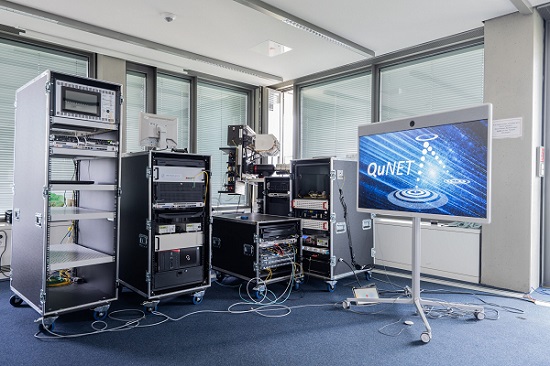BONN, Germany, Aug. 18, 2021 — QuNET, a project funded by Germany’s Federal Ministry of Education and Research (BMBF), demonstrated a quantum-secured video call Aug. 10. The call represents a milestone for the project, the goal of which is the application-oriented development of the physical-technical fundamentals as well as the necessary technologies for highly secure communication networks under real conditions using quantum physics.
The setup of the first quantum-based videoconference between BMBF and the Federal Office for Information Security (BSI) used multiple free-space and fiber quantum channels. Aside from the video conference aspect of the demonstration, the setup also needed to produce scientific data that could provide important insights for communication in future complex quantum-secure networks.

The technology setup on the Federal Ministry of Education and Research’s side to conduct the quantum-secured video call. Courtesy of Fraunhofer IOF.
“Our objective is to take advantage of the work of QuNET and the other projects on quantum communication funded by the Federal Research Ministry to lay the foundations for an ecosystem of producers and providers of quantum communication solutions in Germany,” said Anja Karliczek, the federal minister of education and research. “In this way we can ensure the swift translation of innovative technologies and components into broad application.”
The focus of the QuNET work is quantum key distribution, which enables the exchange of symmetric keys, the security of which can be quantified. If an attacker tries to access the keys to be generated, which are later used for data transmission, the light particles are manipulated. This manipulation is detected together by the sender and receiver, preventing an interception attempt.
The detection is based on physical principles; if an eavesdropping attempt is discovered, the key is discarded and a new one is generated. Through this strategy, only private keys are kept, and therefore long-term security of the agreed keys is achieved.
At the end of last year, the research organizations involved in the initiative — the Fraunhofer-Gesellschaft, the Max Planck Society, and the German Aerospace Center (DLR) — presented important basic principles for modern and secure communication systems for quantum-safe communication, as well as possibilities for exchanging quantum keys over long, medium, and short distances using free-space and fiber systems. The BSI is supporting the QuNET initiative and is preparing accompanying and independent test criteria in international cooperation.